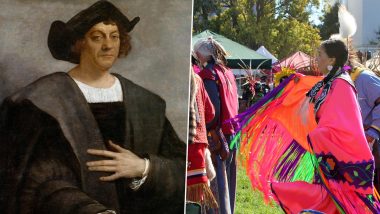October 12 is celebrated as Columbus Day in many American countries. It is marked to celebrate the day on which Christopher Columbus arrived in America back in the year 1492. The landing of the voyage on the New World is celebrated as Columbus Day in the United States but the name varies on the international spectrum. But there is some controversy regarding this day being celebrated as Indigenous Peoples' Day, which is observed always on the second Monday in October. Indigenous Peoples' Day is a holiday that celebrates and honors Native American peoples and commemorates their histories and cultures. Now there's always a debate about the two days and why Columbus day should not be celebrated at all. In this article, we bring you the common questions and answers to them regarding this celebration. Christopher Columbus Statue Pulled Down, Burnt, Thrown Into Lake by Black Lives Matter Protesters in Richmond, Virginia.
Who found America?
As much as people give credits to Christopher Columbus, the Italian explorer for discovering American land, there are a set of theories that dismiss his finding. Some believe that Viking explorer Leif Erikson was the first one to set sails on this land in 1000 AD, nearly 500 years before Columbus. But Erikson and his crew did not stay long as they had hostile relations with natives of North America. Columbus Statues Vandalized on US Holiday Named for Him.
What Does Indigenous Day Mean?
Indigenous Peoples' Day honours the Native American people and commemorates their history and culture. It is an official city and state holiday in various regions. It began as a counter-celebration held on the same day as the U.S. federal holiday of Columbus Day. In all, around 10 states observe some version of Indigenous Peoples Day in October, along with more than 100 U.S. cities. Washington, D.C., is celebrated Indigenous Peoples Day under a temporary measure in 2019.
What is the Debate Between These Two Observances?
As mentioned above, Indigenous Peoples' Day began as a counter-celebration to reject honouring of Columbus. Christopher Columbus' involvement in slave trade and abuse of the indigenous people is why he does not want to be honoured or remembered. It also argues that Natives were already living in this part of the world from a thousand of years so Columbus cannot be remembered for "discovery" of it. His discovery instead brought other European explorers to Western Hemisphere with an idea of colonizing. This violence seen in the European colonialism and destruction and dislocation of ancestral lands of the natives is why Columbus Day celebrations are rejected. People even vandalized his statues to reject this celebration last year.
When did Columbus Day become Indigenous Peoples Day?
Columbus Day is a US federal holiday that commemorates Christopher Columbus. It has been a federal holiday since 1934. In the year 1990, the state of South Dakota officially renamed this day to Native Americans’ Day to shift the focus and honour Indigenous peoples of South Dakota. In 1992, Berkeley in California held the first Indigenous Peoples Day after an organised protest. People successfully petitioned the city council to rename Columbus Day to Indigenous Peoples’ Day.
Usually, this day sees big parades and luncheons organised to ring in the celebrations. But this time because of COVID-19 traditional festivities and parades have been drastically scaled down.
(The above story first appeared on LatestLY on Oct 11, 2020 06:15 PM IST. For more news and updates on politics, world, sports, entertainment and lifestyle, log on to our website latestly.com).













 Quickly
Quickly


